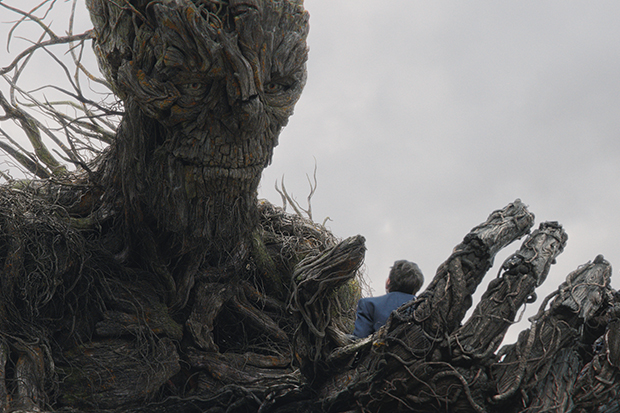A Monster Calls is a fantasy drama about a young boy whose life is crap, basically. His mother is sick. His father has scarpered. He is being bullied at school. He may also have an itch he can’t get at, for all we know. (Always hateful, that.) But he finds an ally when the ancient yew tree he can see from his window morphs into the giant tree monster who’ll take him on a journey of ‘courage, faith and truth’. This has its visually wondrous moments, and the lead (Lewis MacDougall) is a true find, but there’s too much bark, too little bite. This is no Pan’s Labyrinth, for example. Wish that it were, but it is not.
Based on the bestselling book by Patrick Ness, and directed by J. A. Bayona (The Orphanage), it is set in England and in the first few minutes we are plunged into a turbulent nightmare. This is the nightmare as regularly dreamed by our boy, Conor (MacDougall), who must be 13 or thereabouts. Conor dreams of a church tumbling to the ground, cracking, splintering and cleaving as a hole opens up in the earth below. His mother is there and she’s falling into the hole and he’s holding on to her for dear life but she’s slipping, slipping, slipping …he wakes up.
It is a vivid beginning, and a powerful beginning, of the kind that gets your hopes up. Just as, when the ‘monster’ first writhes into branch-cracking life and appears at Conor’s window as a fiery-eyed giant (voiced by Liam Neeson and quite like a Transformer, but leafier), that also gets your hopes up. But hopes raised are soon dashed by the sheer psychological banality of the underlying story.
I am not sure if this is a kids’ film or an adult film but either way there is no complexity, no nuance, no ambiguity as to whether the ‘monster’ is from Conor’s imagination (yew as in ‘you tree’, I’m assuming), and not much need for Dr Freud. Dr Freud, Dr Freud, I had a dream that I was losing my mother and was afraid to let her go. What can it mean? ‘Let me see …that you’re losing your mother and afraid to let her go?’ Sounds harsh, that, and I’m wondering if I intended to be so harsh. Yes. Probably.
Conor is certainly in trouble every which way. His mother (Felicity Jones) has terminal cancer, and she is beloved and perfect. (No dying mother in films of this type is ever a bitch.) His father (Toby Kebbell), visiting from LA, is loving but makes it plain that Conor can’t live with him there. The bullies wait for him every day outside school. He has a grandmother (Sigourney Weaver doing British, which is slightly weird) but she’s cold, uptight and mean. Plus, he probably has that itch. He has conjured the ‘monster’ to help him, but this is a monster that goes all roundthe houses.
The monster says he will tell Conor three stories and once he’s done, Conor will have to tell a fourth story and that story must be ‘the truth’. The monster tells one story about a prince and another about an apothecary, both of which are pleasingly animated and both of which seem to convey the same message — life is sort of messy; good and bad behaviour are not mutually exclusive — but by the time it came to the third story, I don’t know if the film ran out of money but he just blurts it into Conor’s ear. The film builds to Conor’s ‘truth’, which itself is banal, as is the overall ‘it’s OK to grieve’ message. Moreover, although nakedly a weepie, and I’ve done my share of weeping down the years — I’m still recovering from Marley & Me — not a tear budged. Aside from McDougall who is, as I said, a true find, and there is one terrific scene where you can actually feel his anger as he smashes up grandma’s house, the lack of narrative daring coupled with the two-dimensionality of most of the other characters — why have they failed to recognise Conor’s pain? — means that the film itself fails to come properly to life.
It’s not unbearable. And it does have its visually stunning moments. But it has been done substantially better elsewhere.
Got something to add? Join the discussion and comment below.
Get 10 issues for just $10
Subscribe to The Spectator Australia today for the next 10 magazine issues, plus full online access, for just $10.
You might disagree with half of it, but you’ll enjoy reading all of it. Try your first month for free, then just $2 a week for the remainder of your first year.














Comments
Don't miss out
Join the conversation with other Spectator Australia readers. Subscribe to leave a comment.
SUBSCRIBEAlready a subscriber? Log in